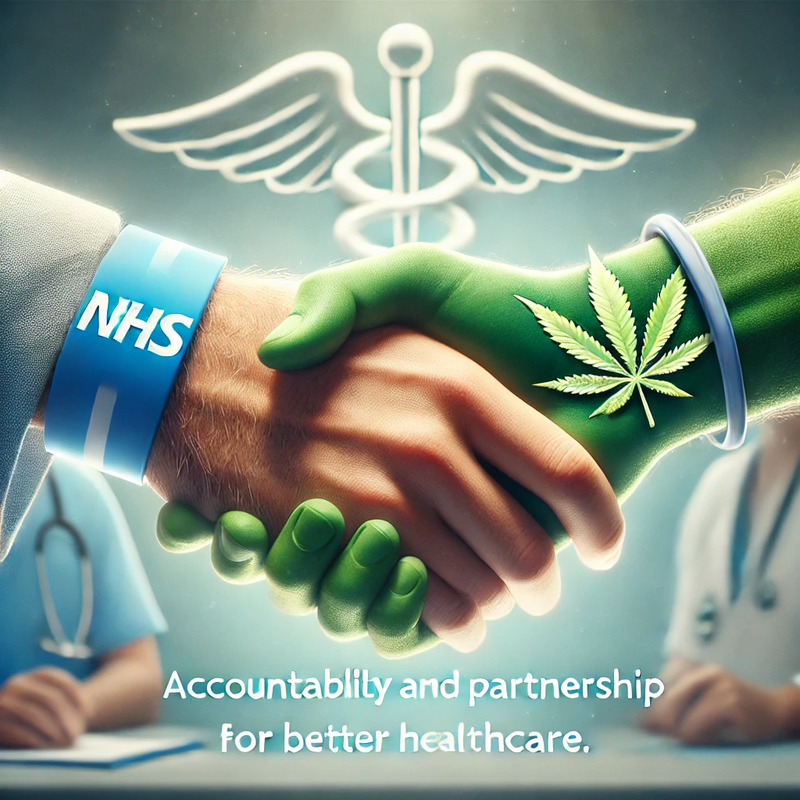
In recent years, medical cannabis has proven its potential to improve lives, yet misinformation remains a barrier in the UK, particularly within the NHS. Over 35 days ago, the CTA took a bold step to address the misinformation surrounding medical cannabis on the NHS’s official website. First making contact via a web form and addressing the issues to the Website team, the ticket was closed and passed on to their Content Team, who have yet to respond. Despite contacting the Chief Executive and directors for comments, the silence is deafening.
The NHS, a pillar of the UK’s healthcare system, is expected to uphold the highest standards of accuracy and accountability. However, when it comes to medical cannabis, its communication has been riddled with outdated and incorrect information. These errors don’t just misinform patients; they stymie industry growth and block access to essential treatments.

How Misinformation Damages Patients
The NHS website is often the first port of call for patients seeking clarity on medical conditions and treatments. When the information provided is wrong or misleading, it has a domino effect:
- Delayed Treatment: Misinformation discourages doctors from prescribing medical cannabis, fearing legal or regulatory repercussions. Patients who might benefit from this treatment are left to suffer unnecessarily.
- Erosion of Trust: For patients already fighting serious health conditions, trust in the healthcare system is crucial. When the NHS, a trusted source, delivers inaccurate information, it creates doubt and frustration.
- Increased Healthcare Costs: Delayed access to appropriate treatments leads to prolonged suffering, which often results in patients requiring more intensive—and expensive—interventions later on.
Impact on Industry Progress
The medical cannabis industry, though nascent, is built on rigorous research, patient advocacy, and regulatory compliance. The CTA has spent years working with various bodies to pave the way for safe and effective cannabis treatments in the UK. However, when a powerful institution like the NHS perpetuates inaccuracies, it hampers industry progress in significant ways:
- Regulatory Paralysis: Incorrect information from the NHS slows the reform of cannabis legislation. Regulatory bodies may hesitate to act if they rely on flawed data or assumptions.
- Investment Deterrence: Potential investors are less likely to back an industry seen as controversial or unclear in its legal status. NHS misinformation contributes to this uncertainty, driving capital away from a growing and innovative sector.
- Missed Opportunities: The UK is falling behind other countries in embracing the benefits of medical cannabis. Countries like Germany and Canada are far ahead in patient access, economic growth, and research, while the UK lags due to these internal roadblocks

Accountability Starts at the Bottom
At the core of this issue is a lack of culpability within the NHS at the lower levels. While the CTA awaits a response from NHS executives, it’s clear that the problem goes deeper. In an organisation as large as the NHS, errors often occur at the bottom, where responsibility is easily diffused. This lack of accountability allows misinformation to fester.
Departments and individuals within the NHS must be held accountable for the information they publish, especially when it impacts patient health and industry viability. The absence of a mechanism to correct these errors quickly and transparently sends a message that the truth can wait—that patients and industry progress can wait.
The Way Forward
The CTA has been vocal in addressing these issues, but action is needed from within the NHS.
- Clear Communication Channels: The NHS must create streamlined pathways for organisations like the CTA to challenge and correct misinformation. This cannot be a long, drawn-out process; lives and livelihoods depend on it.
- Accountability Mechanisms: Each level of the NHS, from senior executives to the individuals responsible for publishing content, must be held accountable for the accuracy of the information they provide.
- Proactive Engagement: The NHS should work with industry experts and advocacy groups to ensure its public communications reflect the most up-to-date research and legal status of medical cannabis.
While we await a response from the NHS, the CTA will continue to advocate for the patients and industry professionals who deserve better. But this issue is bigger than the CTA—it’s about ensuring that public institutions like the NHS hold themselves accountable for the harm caused by misinformation.
The silence on this issue can no longer be tolerated. It’s time for the NHS to step up and correct the record.
Published: 23/10/24







You must be logged in as a member to add comments.
Become a member
Already a member? Log in or create an account.